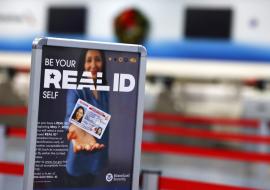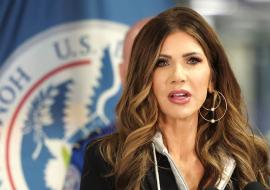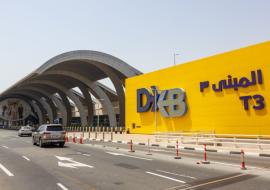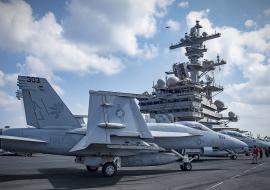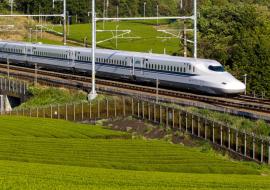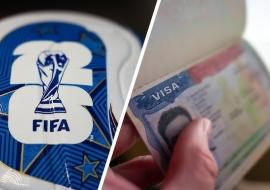Moon Landing Inspired Richard Branson to Build His Own Spaceship

On July 20, 1969, 600 million people worldwide watched, breath held, as a view from outer space was beamed into their earth-bound lives. Among them was a slightly hung over, awe-struck teenager, wearing pijamas, and a dreamy expression.
Clustered with his family around a 12-inch, black and white TV in their living room in Blackheath, south east London, the 19-year-old, who had been out celebrating his birthday, was soon glued to grainy footage of two men hopping across the surface of the moon.
“We were mesmerized,” remembers Sir Richard Branson. “Mum had called and said, ‘Don’t get too drunk, I want you home to watch with us’. For me, it was definitely a turning point.”
It was, in fact, his eureka moment – the moment he decided to “live life on the edge and to the full”.
And the point at which he decided he would become an astronaut, like Apollo 11 heroes, Neil Armstrong, Buzz Aldrin and Michael Collins.
As the world marks the 50th anniversary of their momentous mission, Sir Richard is close to realizing that dream.
In December, his commercial space flight company, Virgin Galactic, flew its first manned craft, Virgin VSS Unity, to the edge of space. In February, it sent two pilots plus a test passenger.
Next year, Sir Richard plans to take the 90-minute flight himself, before offering it to (very wealthy) paying customers.
For all his British manners, he admits it feels good to be “first” in his space race with rival billionaires, Tesla boss Elon Musk’s SpaceX, and Amazon founder Jeff Bezos’s Blue Origin.
Sir Richard, 68, says: “Having got five people into space before the other two, we are obviously pleased. I don’t think Elon and Jeff have said they want to go up themselves, so that race shouldn’t be a difficult one to win. I may be the only one to go up in their own spaceship.”
But what of the moon – some 240,000 miles on? It doesn’t seem to be on Galactic’s radar, whereas Musk and Bezos plan lunar missions by 2023 and 2024.
Sir Richard says: “Of course, who wouldn’t want to go to the moon, or Mars?” So would pride stop him catching a lift with one of his rivals?
He says: “If they were ahead of us and were kind enough to invite me, I certainly wouldn’t turn a ticket down.”
Sir Richard began his meteoric rise in business by starting up a teenage magazine, Student, in 1968, before launching Virgin Records in 1972, then Virgin Atlantic, Virgin Trains, Virgin Mobile, and, in 2004, Virgin Galactic.
He had hoped to make it to space to coincide with the anniversary of the Apollo 11 mission, but that is not to be.
He jokes that he has a habit of missing deadlines. This time it is because Galactic is waiting to test its new launch pad in New Mexico. Last week the firm announced plans to become the first space tourism company to go public.
But he’s in training. He says: “I’m doing about 20,000 steps a day, I have my watch.” Living on his own Caribbean island, Necker, helps his fitness regime.
He says: “I’m lucky where I live is a beautiful island and I can kite surf, play tennis every morning and evening, swim around the island, do weight training every other day.”
He has also trained at a centrifuge center to withstand the G-forces of going from 0 to 3,500mph in eight seconds.
He says: “It’s not too bad, it’s highly doable for most people.” After Sir Richard goes into space, the public can follow. Brad Pitt and Justin Bieber are rumoured to be among those who paid deposits for the £200,000 tickets to see Earth from space and experience weightlessness.
Buzz Aldrin, 89, hasn’t signed up, yet, but “he loves what we’re doing”, Sir Richard assures me. He adds: “Buzz might just be the one person we’d give an upgrade to.”
Sir Richard says he feels no sense of risk in taking the flight – only too aware that test pilots are taking those for him.
In 2014, the company’s plans were devastated when co-pilot Michael Alsbury was killed when the braking system unlocked too early during a test flight from the Mojave Desert, California.
Sir Richard says: “Every time I watch a flight I’m relieved.” The race to space is a dangerous one, which perhaps makes Galactic’s less ambitious plans sensible compared to Musk’s and Bezos’s.
While there is talk of future plans for Virgin Orbit, formed in 2017, to launch satellites, and even for a UK launch pad, the moon and Mars do not feature yet, and the focus remains on getting ordinary people into space.
Even after 50 years, Sir Richard still sounds like an excited teenager when he talks about space travel.
He says: “The moon landings acted as a springboard to a way of doing business for me, a childhood sense of wonder and a belief anything is possible. I have Neil Armstrong and Buzz Aldrin to thank for all that.”
Source: The Mirror







